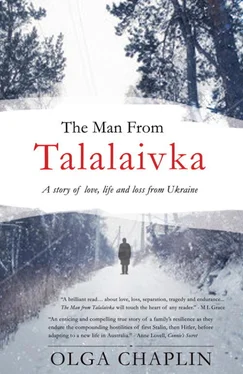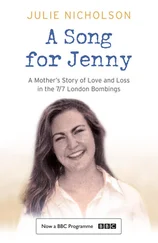Peter studied the map, his fingers tracing several possible routes. A fleeting thought of circuitous diversions to slow these soldiers, even take them off course, crossed his mind. But he pushed the thought aside and took a deep breath, his logic maintained. Evdokia and the children, and all the workers of their farmhouse, were being kept hostage, in the eventuality of just this sort of deviance. And not only they, but perhaps many more kolkhoz workers, would suffer the German reprisals. His heart felt the twist of entrapment as he thought of Evdokia, of her distraught look, her heavy appearance as he last turned from her.
“Dear God,” he thought, “I hope the birth will be without difficulty… I hope they will not come to any harm.”
Swallowing hard as he felt the invisible noose of blackmail tightening, he nodded to the captain and explained the different courses and intricacies of the routes: that there was a possible dual method of speed, of horseback soldiers taking the shortcut laneways and cutting through farmland, the panzer trucks taking the longer but reliable country roads, with their supply wagons following. Given the speed of the panzer trucks, it was just possible both groups would reach Talalaivka in close time.
The captain eyed him, querying, evaluating, as he pondered his motorcade’s safety, looking for a possible trap. Then something caught his attention. He looked up to the sky, listening. High above them, and heading north-east, he could just make out the sound of the Luftwaffe’s Ju88 bombers, generously laden yet still faster than the enemy’s, tearing through the sky to target Moscow. He blinked and focussed back to the map, tapping his finger, then made his snap decision. There was little to lose: a hundred soldiers on horseback, used to clear out the outlying farmhouses, were within his calculation of loss at this crucial time. The race to reach the junctions held even more importance now.
He conferred with his deputy and pointed to the horsemen. “Spalten!” he waved them aside, then “Bewegen!” he ordered, jumped into his jeep and motioned the panzergruppe forward to a country roadway.
“Right! We move this way now!” the second-in-command waved his soldiers on. They reined their horses into line, gave way as Peter followed the interpreter to the front. The motorcade, with powerful engines growling, raced on, churning clouds of dust and exhaust fumes that choked the pristine countryside.
A strange pall greeted them at the outskirts of Talalaivka, as the posse of soldiers rode in. “They must be hiding in their huts… they, too, have nowhere to go,” Peter suspected. These town dwellers, even with their varied skills, were exposed to the same dangers as the kolkhoz farmers as the German advance units moved from house to house to secure the town for their operatives. He watched, his hand quietening his horse as the deputy silently motioned to some of the soldiers to position themselves at cross-streets, the remainder to follow him to the railway junction. Now, each street corner was guarded by well-armed soldiers, having little to fear from the remaining town dwellers, who were left to their fate.
As they reached the junction, the distinct roar of the motorcade reached them. Peter held his reins tight, waiting for the gunfire to begin between remaining Stalin loyalists and the advance units’ gunners, their barrels scouring for enemy movement. He could hear the crackling fire of rifles, the return fire of German gunners… then silence. Stalin’s men knew they could not save this junction now, even if they had wanted to, their token riflemen no match against the gunners, spurting out their continuous rounds of deadly bullets.
The Talalaivka office had an unnerving appearance of fast retreat. “They must have moved out in the greatest haste… not even time to burn the papers,” Peter gauged, with mixed emotions. Only days earlier this centre of bureaucracy had operated with unswerving confidence. Now, he felt a sting of failure at his country’s sudden demise, yet somehow relieved that the buildings had not been destroyed. As he walked through the soviet bureaucrats’ offices and flicked through the open files and papers strewn across the floor, he felt certain that the vital NKVD documents would already have disappeared with Dimitri and Hresha and were possibly already safely filed with their Kremlin masters. Straining to rest, yet tension still pounding him, he could only feel cold security as he leaned against the familiar stuccoed wall, awaiting the commander’s order.
* * *
As the dawn light broke through the protection of night, Peter could hear the motion of horses and motors preparing to move. The interpreter rushed in, his message brief. Still shaking himself awake, Peter caught the words, “Konotop junction.” To his horror, as he stepped from the building to the courtyard, he was summoned to a panzer truck to join the commander. He shook his head and pointed to the laid out map, his finger outlining the direct route on to Konotop and, gesticulating, attempted to explain it was a good road, clearly marked, that they did not need him to direct. He sensed it was safer to remain at Talalaivka: the German soldiers understood his place there, and he was desperate to try to return to Evdokia, the birth imminent.
The captain waved aside his concerns. His jawline firmed, glinting eyes just visible beneath his steel rim. Peter stopped in mid-sentence. He was captive, they were masters, weapons loaded at their sides.
Ever more confident as each kilometre abridged the two junctions, the motorcade moved at a faster pace, the trucks swerving from side to side as they negotiated the pitted country road. Peter realised, as some of the kolkhoz farmhouses appeared at a distance, that they were only a short way from Evdokia’s Yakim and Klavdina. For a few moments he closed his eyes, remembering, visualising the day Klavdina greeted them as they arrived for their visit… of Manya running among the grasses, picking her wildflowers for her babushka. A small invisible hand pressed at his heart, reminding him how long ago that all seemed, now… how crushing Manya’s passing still was.
Suddenly, at a crossroads, the motorcade screeched to a halt, dust from the earth road clouding their view. As it settled, Peter saw the shiny bonnet of another panzer motor, its occupants immaculate in their leather jackets, their distinctive SS officer hats poised. The captain jumped out of his jeep to confer with them, then looked towards Peter.
“O God! What are they planning? Are Klavdina and Yakim… Evdokia, the children safe? Or… is it me they’re after?” His throat tightened again. Anything was possible, now.
The captain returned, gave orders for the trucks to wait under cover of nearby bushes, and signalled his driver to follow the SS officers’ truck. At a short distance, off a side lane, a small farmhouse was just visible, hidden in a grove, its great trees and orchard a natural barrier against all intruders. The cars pulled up at the silent courtyard. The SS officers, in well-practised stance, signalled the captain and spoke in low tones, their fine officer’s hats avoiding the captain’s grubby helmet.
Taking shallow breaths, yet trying to appear calm, Peter prayed silently for strength, fearing the worst. But still he reasoned with himself, that the captain, even the SS men, could have shot him anywhere, did not have to take such a circuitous route for his execution.
They had reached the back of the farmhouse, the old orchard trees tall and dignified even as their fruit had already dropped, past usage.
The SS men took a few steps towards a path, then stopped and smiled knowingly. Peter looked to the captain, his only source of consolation at that moment. Then he caught sight of something, or someone: at first, only trouser legs and boots, moving strangely, above the grasses. He felt sickened, but had to know: either he was to become another hanged Ukrainian, or else these SS men wanted something else. He looked again at the captain, then took the fateful step, uncertain if he was to become the SS officers’ next victim.
Читать дальше












